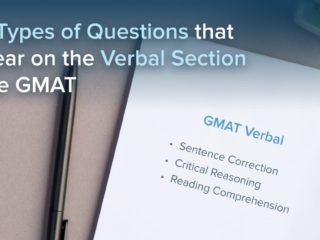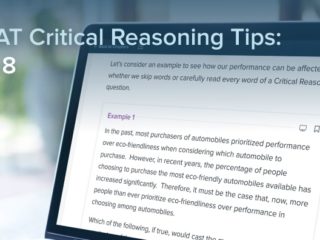| Getting your Trinity Audio player ready... |
Earning a top GMAT score is about more than just mastering concepts and memorizing formulas. To truly master the GMAT, you need to develop 3 distinct types of knowledge:
- conceptual (understanding facts and rules)
- procedural (knowing how to apply those facts and rules)
- operational (executing under test-day pressure).
An effective study plan builds these 3 types of knowledge in phases, first allowing you to learn the content, then to practice it, and finally to perform under realistic, timed conditions.
Read on to learn how to structure your GMAT study plan to strategically incorporate these 3 essential types of knowledge and maximize your chances of test-day success.
Here are the topics we’ll cover:
- The 3 Types of Knowledge for a High GMAT Score
- Phase 1: Building Conceptual Knowledge
- Phase 2: Developing Procedural Knowledge
- Phase 3: Turning Conceptual and Procedural Knowledge Into Operational Knowledge
- Setting Up a Study Plan Based on the 3 Phases
- 3 Critical Types of Knowledge for a High GMAT Score: Key Takeaways
- What’s Next?
Let’s begin by discussing the 3 types of knowledge you’ll need to earn a high GMAT score.
The 3 Types of Knowledge for a High GMAT Score
If you want to earn a high score on a challenging exam such as the GMAT, you’re going to need to develop 3 different types of knowledge:
- conceptual
- procedural
- operational
Conceptual knowledge refers to your understanding of basic facts, concepts, and rules. To use a simple example, knowing how to identify odd and even numbers is conceptual knowledge.
Procedural knowledge is your ability to use conceptual knowledge. Continuing the odd/even example, you can determine that the sum of two odd numbers must be even or that the product of an odd number and an even number must be even.
Finally, operational knowledge is your ability to apply conceptual and procedural knowledge on test day. It’s one thing to be able to identify odd and even numbers and apply odd/even number properties in low-stress study situations, but can you successfully do so under exam conditions?
Operational knowledge is what allows you to apply everything you have learned, even when the clock is ticking and you may be feeling some anxiety.
KEY FACT:
Conceptual knowledge is knowing the basics, procedural knowledge is applying the basics, and operational knowledge is delivering on test day.
Now that we have a basic grasp of the 3 types of knowledge we need to score high, let’s discuss the first phase of a GMAT study plan that incorporates those necessary types: building conceptual knowledge.
Phase 1: Building Conceptual Knowledge
The foundation of your GMAT skill development is conceptual knowledge. So, before you attempt to develop other types of knowledge, you must form this foundation. Thus, the first phase of your GMAT preparation should be focused on building conceptual knowledge. In this phase, you’ll spend most of your study time mastering the content and skills necessary to perform well in each section of the test.
For example, for the Quant section, you might master the concepts of:
- remainder patterns
- the difference between a permutation and a combination
- least common multiple and greatest common factor word problems
- the difference of squares
- factorials
and so on.
In other words, your focus in this phase is on mastering the facts, concepts, and rules necessary for developing higher-level skills. A great way to do so is to use study materials that emphasize topical learning, such as the Target Test Prep GMAT self-study course. By following a topical learning approach, you can be sure that you’ve mastered the content in each GMAT topic you study before you move on to the next topic. In that way, you’ll progressively build crucial conceptual knowledge without leaving any gaps in your learning.
TTP PRO TIP:
In Phase 1, focus on building the conceptual knowledge required to develop the skills you need to perform well on the GMAT.
Next, let’s discuss the second phase of a top-scorer study plan: developing procedural knowledge.
Phase 2: Developing Procedural Knowledge
Once you’ve mastered GMAT content, you’re ready to build procedural knowledge.
In this second phase of your test preparation, you’ll apply learned concepts and skills to answer practice questions, thus developing your procedural knowledge.
In fact, this phase is all about practice: the more practice questions you answer, the stronger your conceptual and procedural knowledge becomes.
By building procedural knowledge, you avoid a common issue that holds students back in the GMAT study process. Many students look at a question and tell themselves that they can answer it, without following through and doing the work. They don’t bother doing the work because they recognize the concepts tested in the question. So, they mistakenly think that the work isn’t necessary.
Come test day, these students discover that recognition isn’t enough: the problem they thought they understood is not that easy to solve after all.
Imagine that you learned about running by reading: you know everything from biomechanics and kinesiology to proper footwear and pacing strategies. Now, imagine running a half-marathon without ever having run so much as a 5k. How’s that half-marathon going to feel?
By answering many practice questions and thereby turning conceptual knowledge into procedural knowledge, you ensure that you’re proficient in problem-solving. How many of us have felt that we could answer a GMAT question with a nudge in the right direction, a little more time, or a slight wording clarification? If you’ve had that feeling, you likely had more conceptual knowledge than procedural knowledge. Phase 2 helps you develop procedural knowledge to match your conceptual knowledge.
TTP PRO TIP:
In Phase 2, build procedural knowledge by applying your conceptual knowledge to realistic GMAT practice questions.
Now, let’s discuss the final phase of a high-score-worthy study plan: building operational knowledge.
Phase 3: Turning Conceptual and Procedural Knowledge Into Operational Knowledge
In Phase 3, your focus must be on building operational knowledge: the ability to use conceptual and procedural knowledge in a high-stakes situation. In this phase, you’ll prepare yourself to battle the full GMAT exam.
During this phase, you’ll spend your GMAT prep time taking full-length, official GMAT practice tests under realistic conditions and reviewing your results. Note your feelings during each exam, your timing, your strengths, and your weaknesses. With each subsequent test, work to improve the flaws discovered during your prior tests.
Crucially, this phase prepares us for the mental and emotional challenges of test day. Just as we had to learn the concepts and the procedures associated with scoring high on the GMAT, we must learn to perform well under test-day conditions. Make no mistake: doing practice questions is significantly different than taking a full, timed test.
Think about how boxers prepare. For all their training—learning punch technique, hitting the heavy bag, going for early morning runs—if they never get in the ring and spar with other boxers, their bodies and minds won’t be prepared for the fight. The GMAT isn’t much different …
I regularly see students who know GMAT material well and have answered many questions. Yet, when test day comes, they score lower than their abilities would indicate. The most common issue? They didn’t build operational knowledge.
While working with these students, I ensure that Phase 3 involves completing every available official practice test. Once they build their operational knowledge, their test scores tend to rise significantly.
TTP PRO TIP:
In Phase 3, take the available full-length, official practice tests to turn your conceptual and procedural knowledge into operational knowledge for test day.
Now, let’s discuss how to incorporate these 3 knowledge-building phases into your GMAT study plan.
Setting Up a Study Plan Based on the 3 Phases
To set up a strategic GMAT study plan that allows for the methodical development of conceptual, procedural, and operational knowledge, divide the total number of months you plan to study for the GMAT by 3. Then, follow the guidelines described in this post for each third of your plan.
To illustrate, let’s say you plan to spend 6 months studying for your exam. So, each phase of your prep will be 2 months long:
Phase 1 (months 1 and 2): Spend 75% of your time building conceptual knowledge and 25% building procedural knowledge.
Phase 2 (months 3 and 4): Spend 75% of your time building more procedural knowledge and 25% building operational knowledge.
Phase 3 (months 5 and 6): Spend 50% of your time building operational knowledge and 50% continuing to build conceptual and procedural knowledge.
In following these guidelines, your goals are to:
- know and understand all of the material tested on the GMAT
- be able to apply your knowledge to realistic practice questions
- be cool, calm, and confident on test day because you know your stuff, can apply your stuff, and have taken enough practice tests that exam day is just another day.
TTP PRO TIP:
Develop a strategic study plan that allows you to systematically build conceptual, procedural, and operational knowledge.
3 Critical Types of Knowledge for a High GMAT Score: Key Takeaways
In this article, we’ve discussed the 3 types of knowledge test-takers need to perform well on the GMAT:
- Conceptual knowledge — the basic facts, concepts, and rules that form the foundation of higher-level skills.
- Procedural knowledge — the ability to use conceptual knowledge to solve realistic GMAT practice questions.
- Operational knowledge — the ability to apply conceptual and procedural knowledge on test day.
We’ve also outlined how to apply the 3 phases to your GMAT study plan, with each phase constituting one-third of your total prep time:
- Phase 1 — 75% conceptual knowledge, 25% procedural knowledge
- Phase 2 — 75% procedural knowledge, 25% operational knowledge
- Phase 3 — 50% operational knowledge, 50% conceptual and procedural knowledge
What’s Next?
Planning to study for the GMAT on your own? Learn more about the phases of preparing for the GMAT and get some tips on setting up a self-guided GMAT study plan.
Looking to improve your Verbal and Quant skills? Learn how to score high on GMAT Verbal and how to increase your GMAT Quant score.



